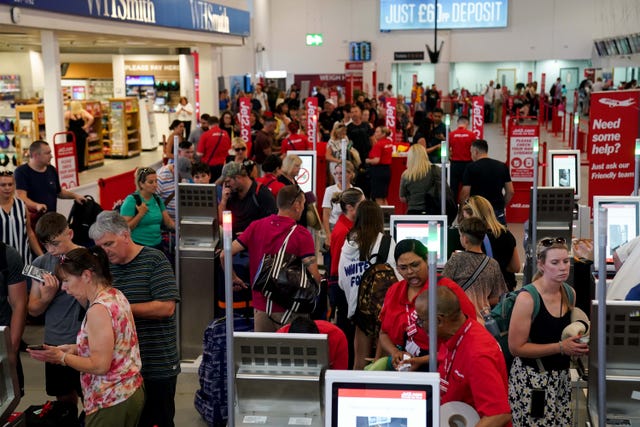NHS England has warned of “continued disruption” to GP services into next week from the global IT outage.
A flawed update rolled out by cybersecurity firm CrowdStrike knocked many offline around the world on Friday, causing flight and train cancellations and crippling some healthcare systems.
A fix was deployed for a bug in the update, which affected Microsoft Windows PCs, on Friday, as CrowdStrike’s chief executive said it would take “some time” for systems to be fully restored.
NHS England said on Saturday afternoon that its systems were “coming back online in most areas” but “still running slightly slower than usual”.
An NHS spokesperson said: “As practices recover from the loss of IT systems on Friday, there may be some continued disruption, particularly to GP services, in some areas into next week as practices work to rebook appointments.
“The advice for Monday remains that patients should attend appointments as normal unless told otherwise.”
Dr Fari Ahmad said the IT outage meant “everything went down” in her surgery and the disruption would cause “a lot more issues later on in the week”.
“We said ‘Sorry, we can’t help you’. We were just trying to deal with the emergencies on the day that really couldn’t wait.
“We couldn’t do our routine stuff, so the implications for us is a lot of that’s been bumped up.”
The National Pharmacy Association (NPA) said that patients collecting prescriptions could still face disruption this weekend.
Nick Kaye, chairman of the NPA, which represents independent community pharmacies in the UK, said: “Systems are by and large back online and medicine deliveries have resumed in many community pharmacies today after the global IT outage.
“However, yesterday’s outage will have caused backlogs and we expect services to continue to be disrupted this weekend as pharmacies recover.”
Estimating the impact of the update, Microsoft said it had affected less than 1% of all Windows machines.
“While the percentage was small, the broad economic and societal impacts reflect the use of CrowdStrike by enterprises that run many critical services,” the firm said in a statement.
“This incident demonstrates the interconnected nature of our broad ecosystem – global cloud providers, software platforms, security vendors and other software vendors and customers.
“It’s also a reminder of how important it is for all of us across the tech ecosystem to prioritise operating with safe deployment and disaster recovery using the mechanisms that exist.”
CrowdStrike chief executive George Kurtz apologised, saying he is “deeply sorry” and made clear it was “not a security or cyber incident”.

Airports across the UK, including London Gatwick, Heathrow Airport, Manchester Airport and Belfast International Airport, said passengers should check with airlines for any delays or cancellations before travelling over the weekend.
Some 207 flights, equating to 6.7% of all scheduled UK departures, were axed on Friday, with others delayed, while 201 flights due to land in the UK were cancelled.
Aviation analytics company Cirium said 6,855 flights, or 6.2% of all those scheduled, were cancelled globally on Friday.
It added that 1,639 flights had been cancelled globally as of 10am on Saturday, including 23 flights departing from UK airports, equating to 0.9% of all scheduled UK departures, as well as 25 arrivals into the UK.
On Saturday the Port of Dover said it was dealing with “hundreds of displaced” airport passengers and urged customers to ensure they had a booking before arrival.
Transport Secretary Louise Haigh said on Saturday afternoon that the IT systems of UK airports and train operators were “back up and working as normal”, but “some delays and a small number of cancelled flights” were expected.

The NCSC said affected organisations should “put in place vendor mitigations”, adding it was also warning about “an increase in related phishing” as “opportunistic malicious actors seek to take advantage of the situation”.
Chartered security professional James Bore said there would be “lingering effects” from the outage.
Mr Bore told Sky News: “If you’ve only got one IT person in the company and 2,000 employees it’s not going to be fixed overnight.
“That’s going to be weeks of work for that person just travelling around or getting everyone to come in and sort out their laptops.”






